“All natural supplements for prediabetes are safe.” “Cinnamon cures diabetes.” “If it’s herbal, it’s better than medication.” These common beliefs about supplements for blood sugar management aren’t just misleading—they could potentially be harmful. The truth about prediabetes supplements lies somewhere between pharmaceutical skepticism and natural remedy enthusiasm.
The reality? Some natural supplements have impressive research behind them, while others rely purely on marketing claims. The difference matters tremendously for the millions living with prediabetes who hope to prevent progression to diabetes. A scientific approach to supplementation can complement conventional treatment, but knowing which supplements actually work is crucial.
At IFitCenter Clinic, we’re committed to evidence-based approaches to metabolic health. In this comprehensive guide, we’ll explore the supplements with genuine research supporting their use in prediabetes management, their mechanisms of action, and how they might fit into a holistic approach to maintaining healthy blood sugar levels.
Natural Supplements for Prediabetes: Important Considerations Before Starting
Before exploring specific supplements for prediabetes, it’s essential to understand the bigger picture. While supplements can be valuable tools in your metabolic health toolkit, they work best when used as part of a comprehensive approach.
Supplements Support, Not Replace, Fundamental Changes
Think of managing prediabetes like building a house. Diet and exercise form the foundation—without them, the structure isn’t stable. Supplements are more like the reinforcement rods within the concrete—they strengthen the foundation but aren’t the foundation itself.
While supplements may help address this cellular starvation at the biochemical level, they cannot overcome consistently poor dietary choices or sedentary lifestyle. According to the American Diabetes Association Standards of Care, lifestyle intervention reduces progression to diabetes by 58%, substantially more than any single supplement can achieve.
Understanding How Prediabetes Supplements work
Glucose metabolism—the process by which your body turns food into energy—is like a complex highway system. In prediabetes, several “traffic jams” occur:
- Insulin resistance: Your cells’ “gates” don’t respond properly to insulin’s “key.” Imagine a door with a rusty lock that needs extra jiggling to open.
- Pancreatic strain: Your pancreas works overtime producing insulin, eventually leading to fatigue. Think of it as an overworked factory struggling to meet increasing demands.
- Liver overproduction: Your liver releases too much glucose, even when not needed—like a faucet with a leak that keeps dripping.
- Inflammation: Chronic low-grade inflammation interferes with normal metabolism—similar to how road construction slows traffic flow.
Effective supplements target one or more of these issues. Some improve insulin sensitivity, others reduce inflammation, while others support pancreatic function or help regulate liver glucose production.
The Critical Importance of Scientific Evidence
The supplement industry is vast and largely unregulated. Unlike prescription medications, supplements don’t require FDA approval for effectiveness before reaching the market. This creates a “Wild West” scenario where marketing claims often outpace scientific validation.
When evaluating supplements for prediabetes, look for those backed by:
- Randomized controlled trials (the gold standard of research)
- Meta-analyses that combine results from multiple studies
- Research published in peer-reviewed journals
- Studies specifically on prediabetic populations (not just animal studies or general populations)
Each supplement we’ll discuss has been selected based on meeting these strict criteria, focusing on those with the strongest evidence for prediabetes specifically.
On the IFitCenter blog, we have prepared an essential guide on the topic of ‘Prediabetes.’ By reviewing it, you will not only increase your awareness about this issue but also gain the ability to control and manage it.
On the IFitCenter blog, we have prepared a comprehensive guide for pre-diabetes, completely free of charge. Using this guide will make controlling and preventing pre-diabetes much easier for you or your loved ones. To access the first part of the content, simply use the links below:
- what is prediabetes?
- prediabetes symptoms
- test for prediabetes
- how to reverse prediabetes naturally
- prediabetes diet foods to avoid
Safety Considerations: “Natural” Doesn’t Always Mean Safe
A common misconception is that natural supplements are automatically safe. However, even naturally-derived substances can have powerful biological effects and potential interactions with medications.
For example, berberine—one of the most promising supplements for prediabetes—can interact with certain antibiotics and blood thinners. Always consult with healthcare providers before starting any supplement, especially if you:
- Take prescription medications
- Have kidney or liver conditions
- Have other chronic health conditions
- Are pregnant or breastfeeding
Remember that supplements powerful enough to affect blood sugar are also powerful enough to have other effects on your body—both beneficial and potentially harmful.
Berberine: The Effective Natural Supplement for Prediabetes
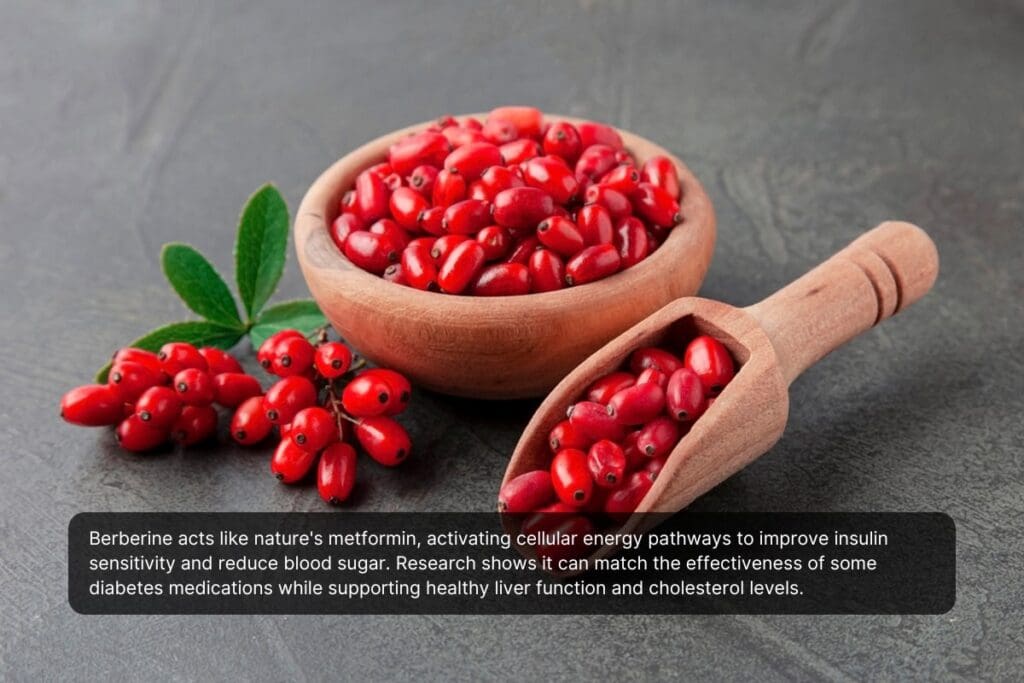
Berberine stands out as the most scientifically-supported supplement for prediabetes management. This yellow-colored compound, extracted from plants like goldenseal and barberry, has demonstrated impressive effects on blood sugar regulation.
A 2021 meta-analysis published in the International Journal of Clinical Medicine examined 7 studies with 859 prediabetic participants. The research found that berberine significantly reduced fasting plasma glucose by 0.39 mmol/L, 2-hour postprandial glucose by 1.51 mmol/L, and HbA1c by 0.20% compared to lifestyle modifications alone. (DOI: 10.4236/ijcm.2021.124014)
What makes berberine particularly valuable is its mechanism of action. It activates AMPK (an enzyme that regulates metabolism), improves insulin sensitivity, reduces glucose production in the liver, and affects gut microbiota. These multiple pathways contribute to its effectiveness, which some studies suggest is comparable to metformin but with fewer side effects.
Despite its benefits, berberine isn’t appropriate for everyone. Common side effects include digestive discomfort (constipation, diarrhea, gas). It should be avoided by pregnant or breastfeeding women and may interact with medications including blood thinners, certain antibiotics, and diabetes medications. Those taking blood sugar-lowering medications should use berberine only under medical supervision to avoid hypoglycemia.
Who May Benefit Most from Berberine
Berberine appears most helpful for those with confirmed prediabetes, especially those with fasting glucose between 100-125 mg/dL, elevated insulin levels, and those who cannot tolerate prescription medications like metformin. Look for products standardized to contain at least 97% berberine and manufactured by reputable companies following Good Manufacturing Practices.
Cinnamon Supplement for Prediabetes: Types, Benefits and Research
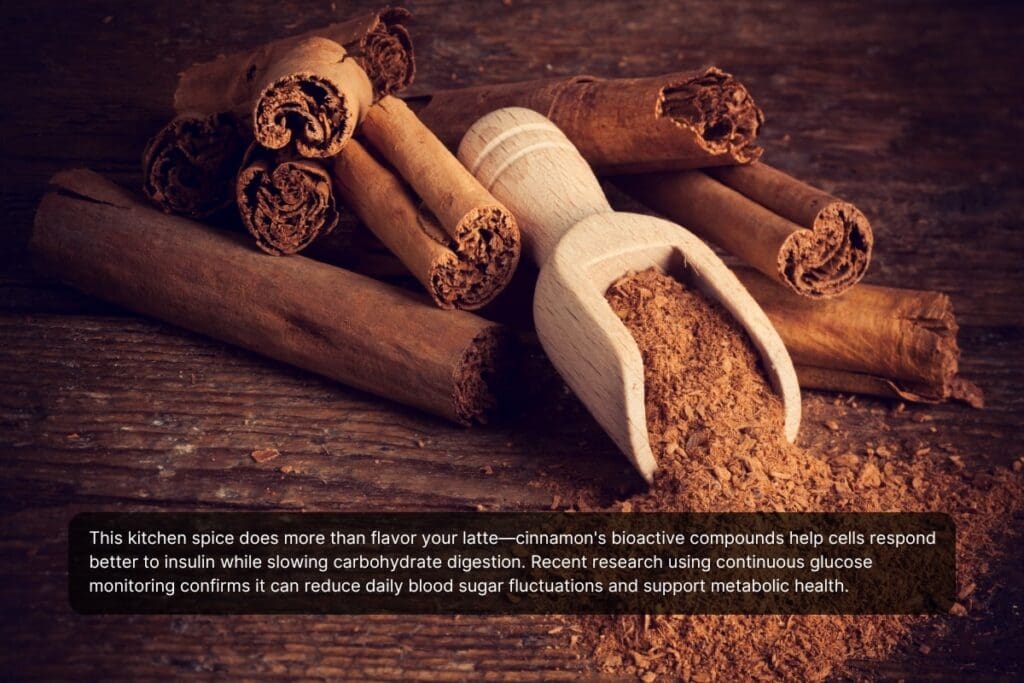
Cinnamon offers an accessible, affordable option for supporting healthy blood sugar levels in prediabetes. This common kitchen spice has gained scientific validation for its metabolic benefits.
A groundbreaking 2024 study published in the American Journal of Clinical Nutrition (DOI: 10.1016/j.ajcnut.2024.01.008) used continuous glucose monitoring to track blood sugar in people with prediabetes. The research found that 4g of cinnamon daily significantly lowered 24-hour glucose concentrations and reduced glucose peaks compared to placebo.
Cinnamon works through several mechanisms: it slows carbohydrate digestion by inhibiting digestive enzymes, mimics insulin at the cellular level, enhances insulin sensitivity, and reduces inflammation that can interfere with normal glucose metabolism.
When considering cinnamon supplements, it’s important to distinguish between Ceylon cinnamon (Cinnamomum verum) and Cassia cinnamon (Cinnamomum cassia). Ceylon cinnamon contains lower levels of coumarin (a compound potentially harmful to the liver in high doses) and is generally preferable for long-term use, although most studies showing benefits have used Cassia cinnamon.
Safety Profile and Recommendations
Cinnamon has an excellent safety profile, though people taking blood thinners should exercise caution due to its mild anticoagulant properties. If using Cassia cinnamon, limit intake to 1/2-1 teaspoon daily for long-term use. For supplement purposes, look for products that specify the type of cinnamon used, with Ceylon preferred for safety during extended use.
Supplements Work Best with the Right Diet & Lifestyle
Supplements can support prediabetes management, but they are not a standalone solution. A structured approach—including the right diet, physical activity, and expert monitoring—is key to reversing prediabetes effectively. Pairing supplements with a clinically designed nutrition plan ensures maximum benefits.
At IFitCenter, we help you:
✔ Create a personalized meal plan tailored for blood sugar control
✔ Combine supplements with medical supervision for safety and effectiveness
✔ Monitor your progress to track improvements and adjust your strategy
Get a science-backed approach to prediabetes reversal today!
Ginseng: A Traditional Herbal Supplement for Prediabetes Management
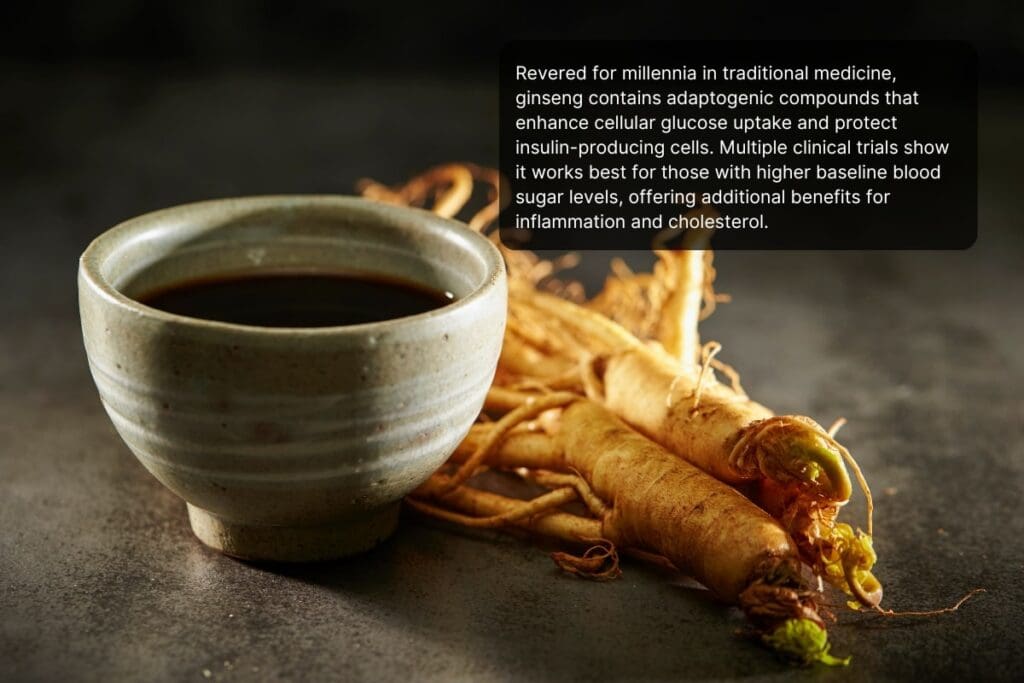
Ginseng, an adaptogenic herb revered in traditional medicine systems for millennia, has emerged as a promising option for prediabetes based on modern clinical research.
A comprehensive 2022 meta-analysis published in Nutrients (DOI: 10.3390/nu14122401) analyzed 20 randomized controlled trials involving 1,295 participants with prediabetes or type 2 diabetes. The research found that ginseng supplementation significantly reduced fasting plasma glucose, decreased insulin resistance, lowered total cholesterol, and reduced inflammatory markers.
Ginseng contains unique compounds called ginsenosides that appear responsible for its metabolic benefits. These work by enhancing insulin production, improving insulin sensitivity, reducing inflammation, and providing antioxidant protection for pancreatic beta cells.
Not all ginseng varieties have the same effects. Asian/Korean ginseng (Panax ginseng) shows the most consistent benefits for glycemic control, while American ginseng (Panax quinquefolius) may better target post-meal blood sugar levels. Siberian ginseng (Eleutherococcus senticosus) is botanically distinct and has less evidence for blood sugar effects.
Ginseng Safety and Best Practices
Ginseng can cause insomnia or nervousness in some individuals due to its mild stimulant properties. It may interact with blood thinners, diabetes medications, stimulants, and immunosuppressants. For optimal results, take ginseng in the morning or early afternoon, and consider cycling use (2-3 weeks on, one week off) to prevent adaptation. Look for supplements standardized to contain 2-8% ginsenosides, specifying Panax ginseng for prediabetes support.
To access the second part of pre-diabetes content, I invite you to use the links below:
- prediabetes and weight loss
- best supplements for prediabetes
- can fasting reverse prediabetes
- difference between diabetic and prediabetic
- obesity and prediabetes
- can vitamin d deficiency cause prediabetes
- understanding blood sugar numbers
- what is hba1c blood test?
Zinc: Essential Mineral Supplement to Reverse Prediabetes
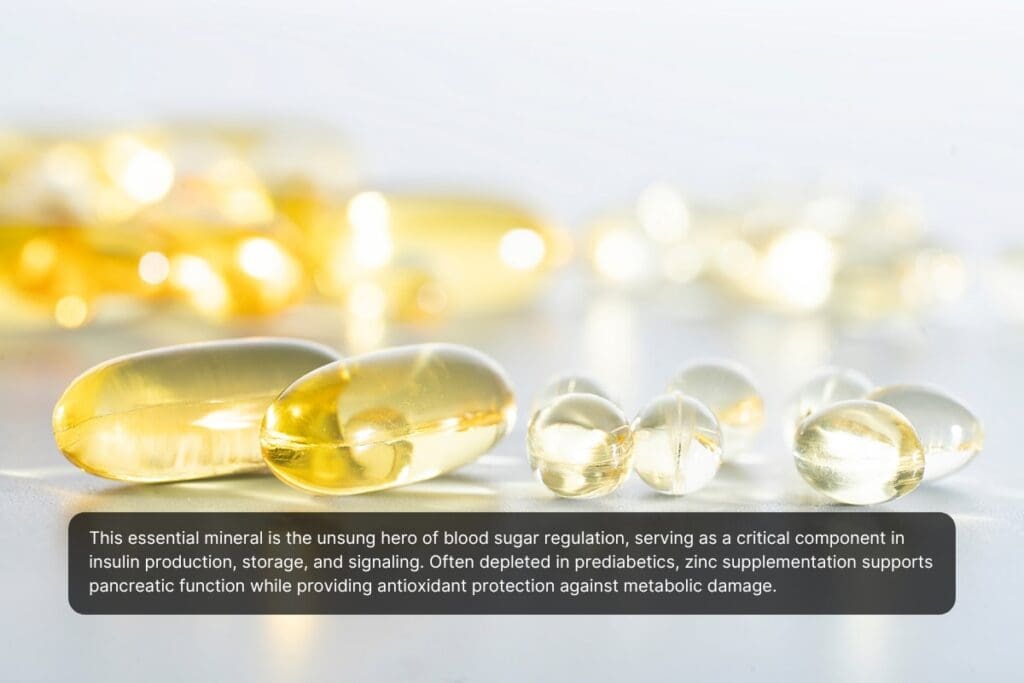
Unlike herbal supplements, zinc is an essential mineral required by the body for hundreds of enzymatic reactions—many directly involved in glucose metabolism and insulin function.
A systematic review and meta-analysis (PMID: 33759442) examining controlled clinical trials found that zinc supplementation produced significant benefits for individuals with prediabetes. Across studies involving 265 participants, zinc supplementation reduced fasting blood glucose by approximately 10.86 mg/dL, decreased post-meal glucose levels, improved beta-cell function, and reduced inflammation markers.
Zinc influences blood sugar control through several key mechanisms: it is essential for insulin synthesis and storage in pancreatic beta cells, helps maintain insulin’s structural integrity, enhances insulin’s interaction with cell receptors, and provides antioxidant protection through its role in the enzyme superoxide dismutase.
What makes zinc particularly relevant is that people with prediabetes often show lower zinc levels than those with normal glucose metabolism, suggesting that zinc deficiency might contribute to prediabetes development.
Zinc Supplementation: Who Benefits Most
Zinc supplementation appears most beneficial for those with confirmed lower zinc levels, vegetarians/vegans (as plant foods contain less bioavailable zinc), older adults, people with digestive disorders, and those taking medications that deplete zinc. For prediabetes management, studies typically used 20-30mg daily, well within the safe range. When supplementing, be aware that long-term zinc intake can reduce copper absorption, so quality supplements often include a small amount of copper to prevent imbalance.
Moringa Oleifera: Emerging Natural Supplement to Take for Prediabetes
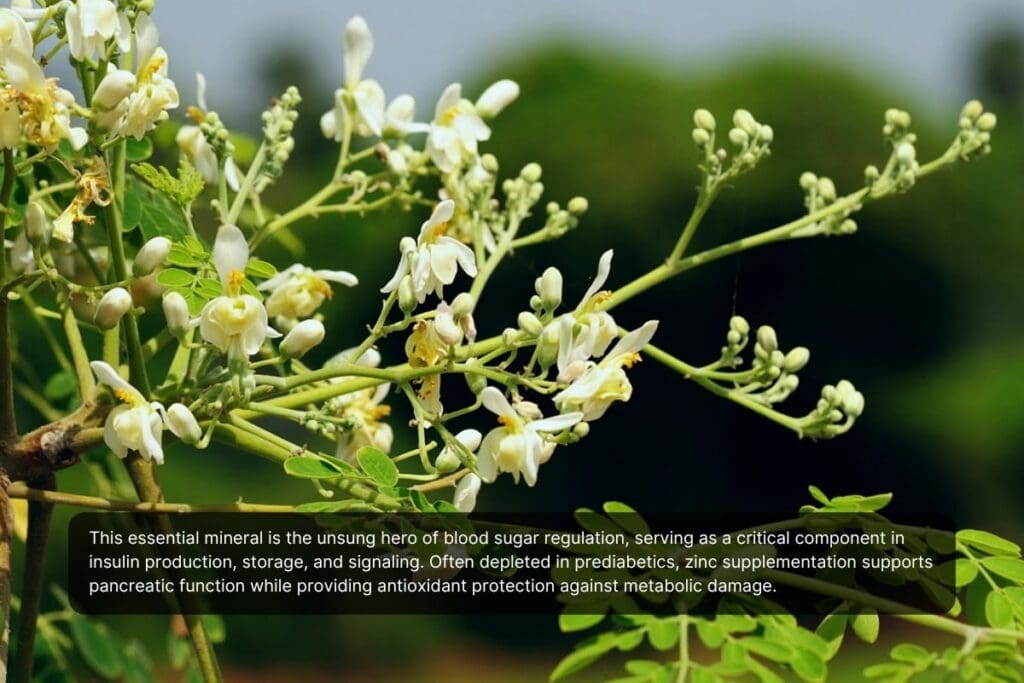
Moringa oleifera, sometimes called the “miracle tree,” represents a promising emerging option for prediabetes management, with a growing body of clinical research supporting its benefits.
A rigorous double-blind, randomized, placebo-controlled trial published in Nutrients (DOI: 10.3390/nu14010057) examined Moringa’s effects in 65 prediabetic subjects. After 12 weeks, those taking Moringa leaf powder (2400mg daily) saw fasting blood glucose decrease by 2.3% and HbA1c decrease by 1.5%, while the placebo group experienced increases in both markers. The researchers concluded that Moringa “might act as a natural antihyperglycemic agent.”
Moringa contains several bioactive compounds that influence glucose metabolism, including isothiocyanates, flavonoids, phenolic acids, and chlorogenic acid. These compounds appear to improve insulin sensitivity, reduce insulin resistance, protect pancreatic beta cells from oxidative damage, and regulate glucose metabolism in the liver.
What makes Moringa particularly interesting is its exceptional nutritional profile beyond blood sugar benefits. It contains significant amounts of vitamins A, C, and E, calcium, potassium, and iron. Unlike many plant sources, it provides all nine essential amino acids, and its antioxidant capacity exceeds that of many superfoods.
Safety Considerations for Moringa
Moringa leaf is generally considered safe when consumed in appropriate amounts, with clinical trials reporting no adverse effects. However, concentrated supplements should be used with caution during pregnancy due to limited safety data. Moringa may enhance the effects of medications that lower blood sugar and blood pressure, and may interact with thyroid medications. When selecting supplements, look for products specifically containing Moringa leaf (not other plant parts like bark or roots, which contain compounds that may be harmful).
Curcumin: Powerful Anti-inflammatory Support for Prediabetes Management
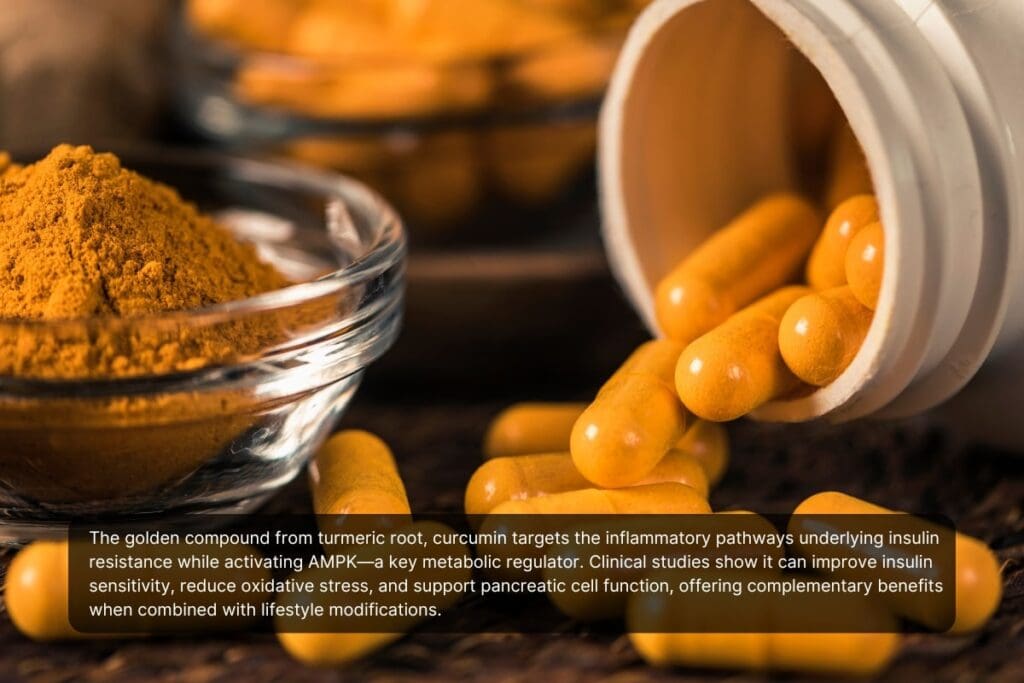
Curcumin, the active compound in turmeric root, has gained significant attention for its potential benefits in prediabetes management. This bright yellow compound offers powerful anti-inflammatory and antioxidant properties that address several underlying factors in blood sugar dysregulation.
A systematic review and meta-analysis published in the journal Nutrients (DOI: 10.3390/nu17010014) examined the effects of curcumin in individuals with prediabetes and diabetes. The research found that curcumin supplementation significantly improved insulin sensitivity, reduced inflammatory markers, and helped normalize glucose metabolism parameters.
Curcumin’s mechanisms of action make it particularly valuable for prediabetes. It activates AMPK (adenosine monophosphate-activated protein kinase)—a master regulator of cellular energy that improves glucose uptake into cells. Additionally, curcumin suppresses inflammatory pathways that contribute to insulin resistance, particularly by inhibiting the NF-κB signaling pathway that triggers inflammatory cytokine production.
One of curcumin’s unique benefits is its protective effect on pancreatic beta cells—the insulin-producing cells that gradually become dysfunctional in prediabetes. Research suggests curcumin helps reduce oxidative stress that damages these cells and may even support their regeneration.
Bioavailability Challenges and Solutions
Plain curcumin has notoriously poor bioavailability—the body struggles to absorb and utilize it effectively. For therapeutic benefits, look for formulations that address this limitation through technologies like liposomal delivery, nanoparticles, or combination with piperine (black pepper extract) that can enhance absorption by up to 2,000%. Studies showing benefits typically use these enhanced formulations rather than basic curcumin or turmeric powder.
Conclusion: Creating Your Personalized Prediabetes Supplement Plan
Several evidence-based supplements have shown promise for supporting prediabetes management, with berberine emerging as the current frontrunner, followed by cinnamon, ginseng, zinc, and Moringa oleifera. However, the most effective approach isn’t about finding a single “magic” supplement—it’s about developing a personalized strategy that addresses your specific metabolic needs.
Remember these key points when considering supplements for prediabetes:
- Supplements complement but don’t replace healthy eating, physical activity, stress management, and quality sleep
- Individual responses vary significantly based on your unique metabolic profile
- Quality matters tremendously – look for products from reputable manufacturers
- Medical supervision is essential, particularly if you take medications
- Consistency is key – benefits typically emerge over weeks to months, not days
When deciding which supplements might be appropriate for your situation, consider your baseline lab work, existing medications, other health conditions, budget constraints, and lifestyle factors that might affect adherence.
Remember that prediabetes is reversible. Many people have successfully brought their blood sugar levels back to normal range through comprehensive approaches that include appropriate supplementation alongside dietary and lifestyle changes.
By taking a proactive, informed approach to prediabetes now, you’re investing in your long-term health and potentially preventing years of complications down the road. With the right tools and strategies, prediabetes doesn’t have to progress to diabetes.
Have you tried any of these supplements for prediabetes management? We’d love to hear about your experiences in the comments below.
To access other content on the IFitCenter’s blog, you can use the following links:
Disclaimer: This article is for informational purposes only and does not constitute medical advice. Always consult with qualified healthcare providers before starting any supplement regimen, particularly if you have existing health conditions or take medications.
Article references
- Wang L, (2021). Efficacy and Safety of Berberine for Prediabetes: A Systematic Review and Meta-Analysis. Scientific Research Publishing. https://www.scirp.org/journal/paperinformation?paperid=108499
- Panigrahi A. (2023). Efficacy and safety of HIMABERB® Berberine on glycemic control in individuals with prediabetes: A randomized, double-blinded, placebo-controlled pilot clinical trial. Frontiers in Nutrition, 9, 987-993. https://pubmed.ncbi.nlm.nih.gov/37679692/
- Zelicha H. (2024). Effect of cinnamon spice on continuously monitored glycemic response in adults with obesity and prediabetes: a randomized controlled crossover trial. The American Journal of Clinical Nutrition, 115(6), 1575-1586. https://pubmed.ncbi.nlm.nih.gov/38290699/
- Naseri K. (2022). The Efficacy of Ginseng (Panax) on Human Prediabetes and Type 2 Diabetes Mellitus: A Systematic Review and Meta-Analysis. Nutrients, 14(12), 2401. https://www.mdpi.com/2072-6643/14/12/2401
- Jayawardena R. (2021). Zinc supplementation in prediabetes mellitus. International Journal of Preventive Medicine, 12, 37. https://europepmc.org/article/med/33759442
- Gómez-Martínez S. (2022). Moringa oleifera Leaf Supplementation as a Glycemic Control Strategy in Subjects with Prediabetes. Nutrients, 14(1), 57. https://www.mdpi.com/2072-6643/14/1/57
- Poolsup, N. (2019). Effects of curcumin on glycemic control and lipid profile in prediabetes and type 2 diabetes mellitus: A systematic review and meta-analysis. PLoS ONE, 14(4), e0215840. https://pubmed.ncbi.nlm.nih.gov/31013312/



